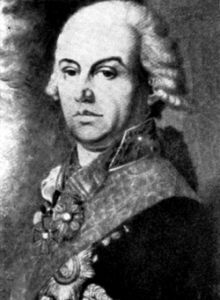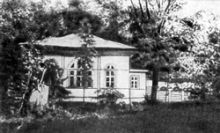A young, talented, and ambitious man born into a noble Ukrainian Cossack family found himself in Saint Petersburg and began to serve with distinction “for a cause without fear,” his Fatherland, which he understood as the Russian Empire. This kind of situation was typical for many of our eighteenth century compatriots. Yet, serving the Russian Empire, they were not at all indifferent to Ukraine in those hard times and in one way or another contributed to the revival of national identity, culture, and science. The destiny of this story’s hero is a most characteristic example of this.
Dmytro Troshchynsky came from a noble and highly respected Ukrainian clan well known in the Zaporozhzhian Sich as long ago as the sixteenth century. His Cossack ancestors were in the service of the hetmans. One of them, Matviy Troshchynsky, an otaman during Peter I’s reign, was repressed because of his close kinship with the disgraced Hetman Ivan Mazepa. The otaman was then suspected of conspiracy with the “traitor” and thrown into prison, where he died. His widow, with an underage son Ivan who later became a regimental clerk, moved to Poltava province.
Having started a family, Ivan Troshchynsky bought an estate in the village of Yaresky, Myrhorod district, Poltava province, where four sons were born to him. One of them, Ivan (known as Amphiloch in church circles), devoted himself to religion and became an archimandrite in Kyiv and later bishop of Pereyaslav. Another, Prokofy, father of the future courtier Dmytro, saw service as a senior Cossack officer.
According to family tradition, former Cossack officer Prokofy Troshchynsky decided to send his sons Andriy, Yukhym, Demyan, and Dmytro to the Zaporozhzhian Sich then in its last days. Elder son Andriy returned and married soon after. The other brothers, except Dmytro, did the same. They lived modest and undistinguished lives. A different destiny was in store for the youngest brother Dmytro, born in 1754.
Assisted by his uncle, Archimandrite Amphiloch, he was enrolled in the Kyiv Theological Academy (as they downgraded the Kiev-Mohyla Academy before its closure — Ed. ). After completing his academic course with distinction, Dmytro Troshchynsky entered the civil service in the Little Russia Collegium in 1773. Shortly before, he served at a military headquarters stationed in Moldavia, where he caught the eye of a high-placed Russian dignitary Nikolai Repnin who kept him under his guidance until the beginning of the second Russian-Turkish war of 1787. Incidentally, the clan of the Repnins or, to be more exact, Obolenskys, also has Ukrainian roots and dated back to Prince Mykhailo of Chernihiv. The new name derived from the nickname Repnia (turnip) given to Ivan Obolensky who died in 1523.
Prince Repnin, appointed ambassador extraordinary and plenipotentiary to Constantinople in 1775, took Dmytro Troshchynsky with him as his private secretary, and the latter acquired the necessary experience and paperwork skills.
An accident of her majesty brought D. P. Troshchynsky closer to the tsarist court, when in 1787 he and other functionaries were in the retinue of Empress Catherine II during her tour of New Russia (Southern Ukraine). When the party stopped over in Kyiv, Prince N. V. Repnin introduced Dmytro Troshchynsky, along with others, to the empress and then assigned him, as an experienced and reliable civil servant, to Count Aleksandr Bezborodko. The young functionary was promoted to State Councilor as early as 1790. In 1793 Catherine the Great elevated him to State Secretary and, three years later, to Full State Councilor.
Troshchynsky’s star also did not wane under Emperor Paul. In the very first days of the new emperor’s rule, Troshchynsky was among the individuals closest to him and attended the successor’s coronation in Moscow.
Dmytro Troshchynsky came up to his ambitious expectations. On The Day of the coronation, Paul I personally bestowed on him the regalia of the Knight Commander of St. Anne Order, first degree, and then, almost annually, conferred new awards, promotions, and other signs of approbation on his favorite.
Like his mother before him, the emperor also gave Dmytro Troshchynsky material benefits, while the latter indefatigably worked for “the good of the fatherland” to the detriment of his own health.
Paul I’s successor, Alexander I, also appreciated the good that D. P. Troshchynsky was doing the Russian Empire. He once presented him with a diamond ring worth 7000 rubles (an enormous amount for those times). The emperor appointed Troshchynsky member of the State Council, Postmaster General and later, when ministries were instituted, minister for land reform. Troshchynsky held the latter office from 1802 to 1806.
The awards D. P. Troshchynsky received for his irreproachable service were by and large well-deserved. According to Nikolai Grigorovich, biographer of the Most Illustrious Prince Aleksandr Bezborodko, “one must try and collect a great many ukases he wrote, now stored in state archives. With their beautiful manner of presentation and laconic style, they can all serve as the best examples of business style in the period of Catherine’s reign. In this respect, they are by no means worse than the pieces written by his superior Bezborodko.”
What testifies to Emperor Alexander I’s special trust in D. P. Troshchynsky is the fact that the latter was a member of the Privy Council also consisting of V. Kochubei, V. Novosiltsev, P. Zavadovsky, A. Czartoryski, A. Varentsov and other eminent freemasons.
In spite of his far from old age, Troshchynsky felt his strength dwindling and needed at least a temporary rest. He pined very much for Ukraine and its kindhearted people, dreaming of spending his remaining days in his beloved homeland. But these dreams were to come true not so soon. Only in 1806, when Troshchynsky’s health took a serious turn for the worse, did Alexander I allow him to resign. Being awarded a handsome pension, Troshchynsky set off to his homeland, where his Poltava peers elected him provincial marshal of the nobility. He spent eight years there, mostly in the village of Kibentsy, Myrhorod district, in the circle of his relatives and friends. At that time he corresponded with the great Field Marshal Mikhail Kutuzov whom he had met during the first Russian-Turkish war of 1768- 1773. Later, they often saw each other in 1808-1812 in Kyiv, where Kutuzov had his own house and held the office of Kyiv governor-general. They would also meet at Kaharlyk, where Troshchynsky supervised the building of a palace and park complex.
Even in the hard times of the war against Napoleon, Field Marshal Kutuzov managed to find time to write Troshchynsky. In his letters, he expressed gratitude for organizing Cossack troops and addressed him “with a cordial devotion” as “my old benefactor.” He told his friend about the course of hostilities and shared his sentiments.
Two years after Russia defeated France, Dmytro Troshchynsky found himself again at the tsarist court, this time as delegate of the Poltava nobility, and was received, quite benevolently, by the emperor. Moreover, the monarch invited him to a private dinner attended by a very limited circle. Then came invitations from other members of the tsarist family. But Troshchynsky did not intend to stay long in the capital. Suffering from the damp climate of St. Petersburg and about to leave for his native Poltava province, he suddenly received a high- level appointment that he could not refuse. Dmytro Troshchynsky was appointed Minister of Justice of the Russian Empire. He displayed the same zeal in the new office, but this adversely affected his health and in addition his daughter Princess Nadezhda Khilkova, who also lived unhappily married in Petersburg, was slowly dying of an incurable disease. Still devoted to work and his Fatherland, Troshchynsky stoically withstood his ailments and the blows of fate. The contemporaries called him “the scourge of justice and protector of the poor.” Indeed, he engaged in successful charitable activities in St. Petersburg, Kyiv, and Poltava, donating money to educate children from poor families. Every year at least ten young people born into the Cossack families of Kibentsy, Yaresky, Myrhorod, Kaharlyk, and other towns and villages went to study at Poltava’s educating center for the poor gentry (Cossacks). Tellingly, one of the governors of this educational institution was founder of Ukrainian literature Ivan Kotliarevsky.
The world would have hardly heard of Nikolai Gogol, a writer of genius affectionately called Nikosha in childhood, had he not been “protected” by Dmytro Troshchynsky. As the parents of the future luminary of Slavic letters were quite poor, the noble courtier took fatherly care of his relative and paid a handsome 1200 rubles a year for Gogol’s studies at the Nizhyn Gymnasium.
Dmytro Troshchynsky was destined to hold the ministerial office for quite a short time. The constant signs of disposition from top dignitaries to a person who did not belong to the court aristocracy brought forth much envy and ill- wishes, including Arakcheyev who wielded tremendous influence at court. By force of his independent nature, Troshchynsky never kowtowed to anybody. What finally brought him down was an irreparable loss, the death of his only daughter, Princess Nadezhda Khilkova, in 1817. This was in fact the main reason why Dmytro Troshchynsky retired. In 1822 he finally moved to his beloved Kibentsy. There he was often visited by Nikolai Gogol’s mother M. I. Kosiarovska called Whitie for her unusually beautiful fair complexion. Legend has it that she was the most beautiful woman in Poltava province. The Troshchynskys’ house received the cream of Petersburg high society, including generals, Counts Buturlin, Bibikov, et al. The host himself was a deeply religious and rather sentimental person closely attached to his native land.
One of his contemporaries recalled, “Sometimes he asked his friends to sing a well-known Little Russian song about a seagull which allegorically represents Ukraine as a bird that has made a nest at a crossroads. Listening to the song, the venerable Troshchynsky would cover his eyes with his hand and cry.”
Dmytro Troshchynsky died at the age of 76, preserving unimpaired his eyesight, hearing, memory, and lucid mind until his death. He was a person of a kindhearted, noble, fervent, and energetic nature showing exquisite taste. He left a large collection of old coins and medals, a huge library of several thousand books, a collection of arms and tobacco boxes, many pieces of art, and paintings by the great masters. But the main immortal thing that Troshchynsky left is a good memory of himself.








